#Hierarchies
Text
Can we please stop putting down autistic, ADHD, and other neurodivergent people whose traits are considered 'cringe', 'dorky', 'weird' or something else considered to be socially unacceptable?
We get enough shit from neurotypical people—we don't need to throw each other under the bus too.
"But they're making us look bad!"
I. Don't. Care. It's wrong to put each other on hierarchies. Simple.
#neurodivergence#neurodivergent#ableism#autism#autistic#actually autistic#adhd#actuallyautistic#audhd#aspie supremacy#pick me behavior#internalized ableism#hierarchy#hierarchies#actually audhd#actually neurodivergent#neurodiversity#vent post#rant post
5K notes
·
View notes
Text
Humans are NOT THE MAIN CHARACTERS of reality!
There are no main characters!!!!
No one rules nature!!!!
Nature isn't hierarchical!!!!!!!!!
3K notes
·
View notes
Text

Frank Kelly Freas, Hierarchies, 1973
59 notes
·
View notes
Text
It’s praxis to be nice to kids. Cruel attitudes toward kids hurts and hurted you, as well.
400 notes
·
View notes
Text
You know, we tend to think about play centered around the boundaries and interactions of power dynamics as a kink thing, but I think that's a bit short-sighted. Perhaps it's that I have mostly taught adults—which imposes a distinct but limited power dynamic on the working relationship—but I find I use play constantly to help frustrated or shy students relax, especially when relaxing about the possibility that I am particularly upset, impatient, or judgemental about their temporary struggle. Lots of smiling, careful observation of body language—if they stiffen further they're not necessarily parsing that it's play and I need to change tactics. I often make an explicit statement like "oh no, the horror, you're learning," smile as warmly as I can project, validate the frustration and point to any clear progress I see, and then ask questions about the place where they're struggling.
Trying to use cuts more to spare dashes, but the more I think about it, the more I keep coming up with examples of boundary/hierarchy play in cases of strong working relationships between established dynamics. It's not something I only engage in from top down, either: I also offer play gestures around boundaries to people who are supervising me, if and only if I otherwise like and trust them enough to do so.
Often students will engage in mock boundary pushing at "boundaries" that they have observed that I don't give a shit about, like the time one of my students was asked to explain why his DNA signature was "found" on a broken pipette in genetics class (implied: he was being charged with breaking it as part of an exercise in interpreting DNA fingerprinting data) and he submitted a two page legal brief with fully referenced case law mock accusing the class of stealing his genetic material without a warrant. (I was delighted. I often think fondly of that student, who had been enlisted military and clearly enjoyed play mocking the "brass," but was also absolutely respectful and engaged when it actually mattered.)
I see that with my dogs, too. For example, yesterday I observed Tribble catch my eye, start briefly digging in the garden—a behavior I pointedly discourage and have for most of her life—wiggle, and then take off to race around the yard while I stomped after her and pretended to be mad until she bounced up to the door and requested to come inside. (She was almost certainly getting cold.)
It's always risky to make inferences about animal signals and especially intentionality without good falsifiable hypotheses about what is being intentionally conveyed and unpacked, so just to be specific: she wiggled using very loose body language of the kind that we usually use when playing as we made eye contact, dug until I made an exaggerated outrage face and took a step towards her, and sprinted away to zoom around the yard in a way that a nearly thirteen year old dog generally does not do unless she has a strong, motivated point to make. I was also using exaggerated play versions of outrage: mock stomping my feet with big steps with no stiffness, waving my head from side to side in a gesture I make when playing with animals, a very offended high pitched "oh!" noise I don't make when I'm actually annoyed. Play around mock offense over a mock transgressed boundary, taking delight in each other's attention.
And I mean, she and I have known each other for almost twelve years. This is the dog I accidentally trained using only my idiosyncratic body language for cues; she never bothered to listen for vocal cues until Tay tried to ask her for things with slightly different hand signals and she was bewildered. We're both pretty good at reading each other at this point.
I just think there is a strong tendency to carve out hierarchy and boundaries as Very Serious Business all the time, especially when we are thinking about ethical power dynamics. But it's not always, not even close: ethical play across boundaries should be consensual and bidirectional (even if the social hierarchy isn't entirely consensual, as with parent/child or dog/handler relationships), and if it's not it should cease. We've all seen the mortification of bosses who attempt play with subordinates who are Not Enjoying Themselves, right? You've all seen The Office?
I'm just enjoying thinking about boundaries and hierarchies in this way this morning. We (by virtue of the fact that you're interacting with me on the Anglophone Internet, anyway) live in a culture that finds hierarchy and explicitly acknowledged power dynamics really distasteful and uncomfortable, but those dynamics are still real and they absolutely exist. As someone who has some distinct scars from people who had power over me but wanted to pretend that we were peers when that was convenient, I think there's something valuable about acknowledging how much play can be held in a healthy, solid nonsexual relationship that still has power dynamics and firm boundaries.
34 notes
·
View notes
Text
Why is ranking friends, relationships even a thing? Why are there literal names that exist due to hierarchies? Why do you have to name and put a specific label on the person you’re the closest to and always prioritize them? Why? /rh You know, you feel it, you know you’re the closest to this person already, so why put that into words and put it into a hierarchy? Your best friend isn’t more important than anyone else. Where is equality in this? /rh Everyone’s worth is equal. /srs Why do you “have” to tell people that you view someone else as more important than them and that you love someone else more? /rh Why? /rh It hurts. Let’s actually stop putting relationships and people into hierarchies. It’s so insidious, commonized and internalized in this society that most people don’t even realize how bad it is.
“you” /nay specifically
#anarchy#anarchism#anarchist#relationship anarchy#hierarchies#hierarchy#oppression#oppressive#hierarchies are inherently linked to every system of oppression and discrimination#without hierarchies oppression wouldn’t exist and supremacies wouldn’t exist
21 notes
·
View notes
Text
Why I don't believe that the existence (in themselves) of illness, chronic pain, or disability, makes the world "Unjust"
The following is the meat of a reply I made on this post -- that came up when I was searching for something else; but I think it stands on its own, and bears repeating
To me, "justice" is an aspect of social interaction -- with an emphasis on action -- how we treat each other (including how we treat the world on which we, and other living things, depend).
That includes reciprocity: a sharing of wealth with those who have shared with us. This gets abstracted into "earning rewards" (just rewards) and also, in the negative, "earned retribution." If we become disabled or ill without having done anything to "Deserve" it, it can feel unjust. But that doesn't mean it is. Because not everything that happens to us (for good or ill) is earned. In fact, most things just happen at random.
The injustice that so often accompanies chronic pain, illness, and disability, stems from how disabled and ill people are treated in society, and are habitually shamed for requiring their needs to be met in different ways, instead of being treated with kindness and dignity.
The thing is, though: those at the top of the social hierarchy claim that all manner of social norms are "Facts of Life," instead of deliberate choices we make (and can therefore change).
Conveniently for them, they're always on the beneficial side of these norms.
9 notes
·
View notes
Text
Many societies always were dystopian depending on the perspective. It’s just that most societies today are also explicitly dystopian to the people who are supposed to do the work of maintaining them to get rewarded.
And why is that? Because it has been revealed that the people maintaining these societies were never its intended beneficiaries. In fact, you are not even supposed to want a bearable existence in return for your labour. Praiseworthy labour is labour that is treated as the ultimate priority, before health, family and pleasure. It’s basically a gradual form of human sacrifice.
If we’re being honest, powerful people never really let go of serfdom or slavery. It was always there in the ways they conceived of society and its purpose. They have revived both in some parts of the world, but the wage labour and digital serfdom most people perform is ideologically linked to both forms of dehumanisation.
Capitalism is our current enemy, but the perpetuation of steep unaccountable hierarchies, the desire to subordinate the existence of others to your own is the core darkness that must be overcome.
#society#anti capitalism#dystopia#dystopian#Labour#work#politics#hierarchies#anarchism#socialism#communism
15 notes
·
View notes
Text



More random tidbits I have saved in my collection
2 notes
·
View notes
Text
Question
Is it a good thing to make money? Cause I think Liberals general think it is a good thing to make money. But of course, freaking Liberals and their love of unjust hierarchies.
#politics#capitalism#anarchism#socialism#Liberals#unjust hierarchies#hierarchies#Liberalism#money#economy
3 notes
·
View notes
Quote
Observe people's behavior towards you when you don't have status, then observe them again once you have one. You'll see their true colors.
Lady Macabre Beth
#status#merits#merit#meritocracy#hierarchy#hierarchies#society#norms#socialnorms#truecolors#istj#estj#esfj#isfj#esfp#isfp#istp#estp#leo#virgo#capricorn#taurus#gemini
18 notes
·
View notes
Link
As early as the 1850s, scholars proposed that the ancestors of the first Sanskrit speakers had come to India from elsewhere. More recently, genetic evidence has helped establish a scholarly consensus around the migration of this community from Central Asia to India. Nonetheless, the idea of ‘indigenous’ Hindus and ‘foreign’ Muslims proved much more difficult to dislodge. The notion of irreconcilable difference between these Hindus and Muslims contributed to the 1947 partition of British India into the independent nations of India and Pakistan: the greatest mass migration in human history, leaving a million or more dead and 15 million displaced.
The Iranian nationalists’ narrative of Persian indigeneity was similarly ethnocentric. It became the cornerstone of the 20th-century Pahlavi dynasty’s ideology, which marginalised Iran’s minorities such as the Arabs. Identification with ‘Aryanism’ remains common to this day in Iran.
All of this is to show that modern nationalist narratives about language departed radically from how Iranians and Indians had for centuries before conceived of language, of themselves, and of their relationship to Persian. From about 900 to 1900, Persian had been a cosmopolitan lingua franca, a common idiom of learning and statecraft across much of the eastern Islamic world, from the Balkans to China. Rigid hierarchies, among them age, gender, social status and class, stratified Persianate societies. They were cosmopolitan, however, in the sense that ethnicity and language did not form the basis of hierarchies; there were no special privileges reserved for native Persian speakers. Indeed, before the 19th century, no such concept of ‘native speaker’ or ‘mother tongue’ existed, and having a Persian education was much more significant than speaking Persian at home. There had been no geographic core or centre to the Persianate world. If anything, it could be argued that its heart lay in India, where various dynasties like the Mughals patronised the language, outpacing even Iran in Persian literary production.
7 notes
·
View notes
Photo

In performances and installations, one of the aims is to escape the hierarchies of the senses or at least create a sensation, a sort of disorientation to destabilize the perpetual ordering of things which is a habit inherited from colonial systems, the hierarchy of knowledge and whatnot. (via LAMIN FOFANA, larger framework of Black culture on the cusp of sound & written word | Cloth Magazine)
2 notes
·
View notes
Text


#tax cult#screen shot#variable over PRIME#MIXED NOR NOT SHARED#gestalt model#components library#bibliographic universe#FRBR#WEMI#no WIKI#hierarchies#007#37#17#73#jo#economy pawn#tesseract#tensor#lattice#NJK#NJK+#©2024#glorclear#🎬#credits#gags et al.#you will NEVER BE ON AMERICAN SONGWRITER#courtesy of:#World Wide SONGWRITER
0 notes
Text
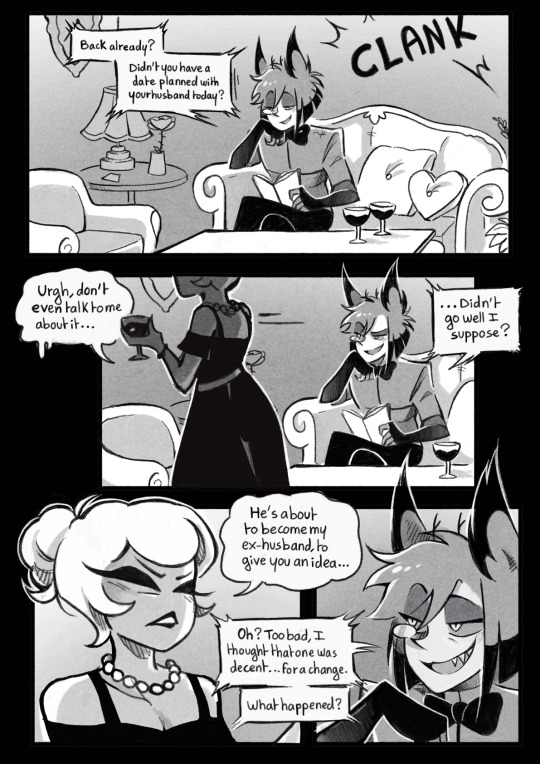
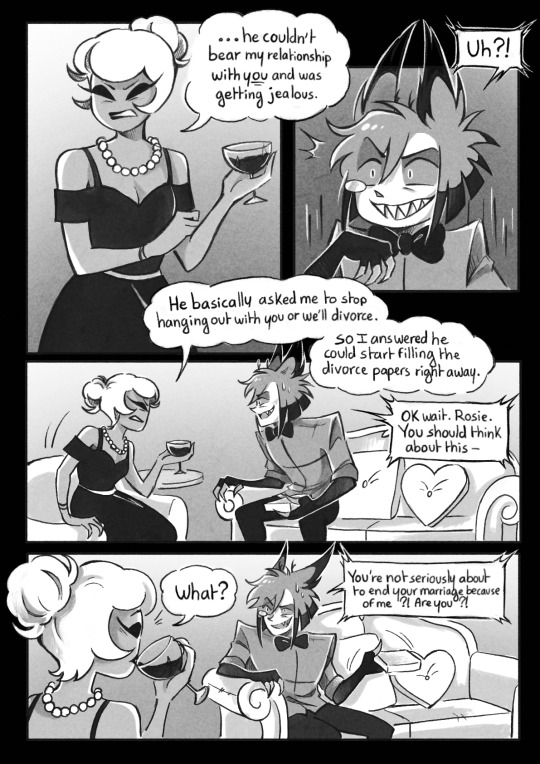
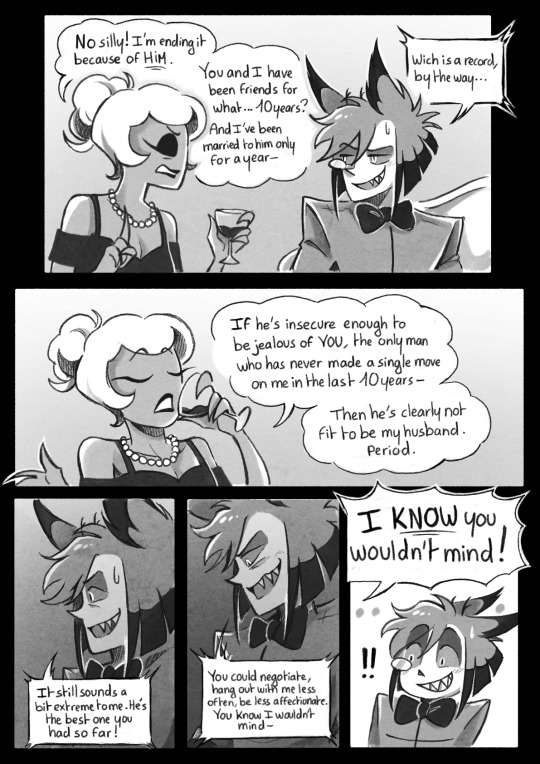
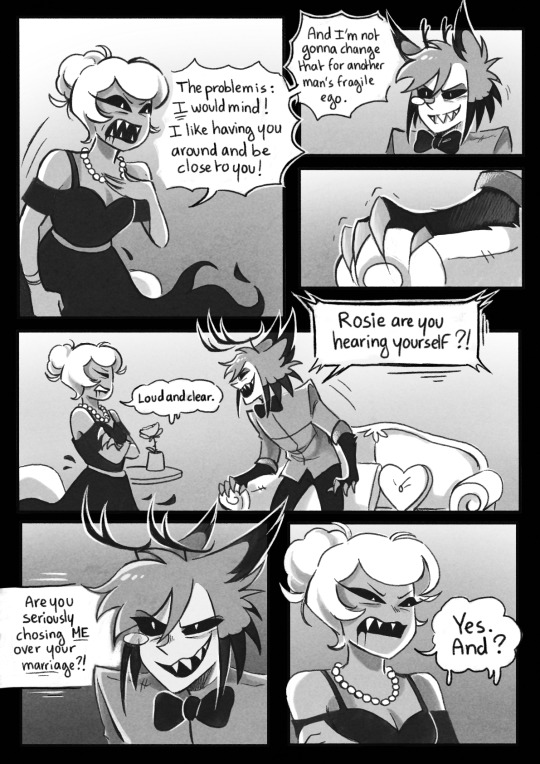
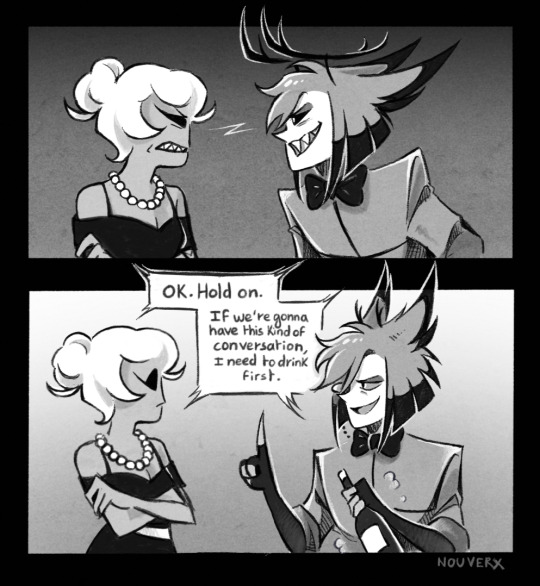
*proceeds to drink the whole bottle*
Yeah Alastor you're gonna be loved and appreciated wether you want it or not :)
#hazbin hotel#hazbin hotel fanart#hazbin alastor#hazbin rosie#radiorose#platonic radiorose#qpr radiorose#even tho they have no idea what label to put on their relationship at this point#hazbin comic#comic#my art#autodesk sketchbook#it probably looks ooc from alastor to react like this but poor man has only learned his whole life that relationships have a hierarchy#“marriage > a simple friendship” in his brain and it's confusing for him that Rosie would put her friendship with him over that#also Rosie was pissed of how terrible her date went and as soon as she comes home Alastor sides with her ex husband#just to explain why she got angry so quickly basically they couldnt really understand each other that's why they got angry#I love cute fluffy radiorose but its good to see them argue sometimes eheh#I needed to get this idea out of my system and made it into a whole comic
8K notes
·
View notes
Text
Hierarchies are the root cause of every oppression that exists, the second you get rid of them, oppression will cease to exist as well. Why? Because oppression is on the hierarchal idea that one group is below/above the other. If everyone actually realizes that everything is actually equal and there’s nothing inferior to you nor superior to you, oppression will cease to exist automatically, by itself.
If everyone viewed things the way they are, which is everything is inherently equal, then everyone would feel really happy. I don’t know what’s holding back people, probably a lack of self worth and collective worth. Which, by the way, were all created through lies and lack of shown love, care and truth. Which is caused by the systems we live in. It’s all a cycle, the systems create low self and collective worth, which makes people reproduce the systems even more and not allow themselves to believe in the reality that we’re all equals.
Most people are constantly bringing themselves and others down through the repeated violence the systems have taught us, which is so common that most don’t even realize how often they’re bringing anything down.
#anti hierarchies#anti hierarchy#anarchism#collectivism#socialism#anti white supremacy#anti oppression#oppressive#oppressive systems#anti capitalism#anti ableism#equality#equity#hierarchies
3 notes
·
View notes